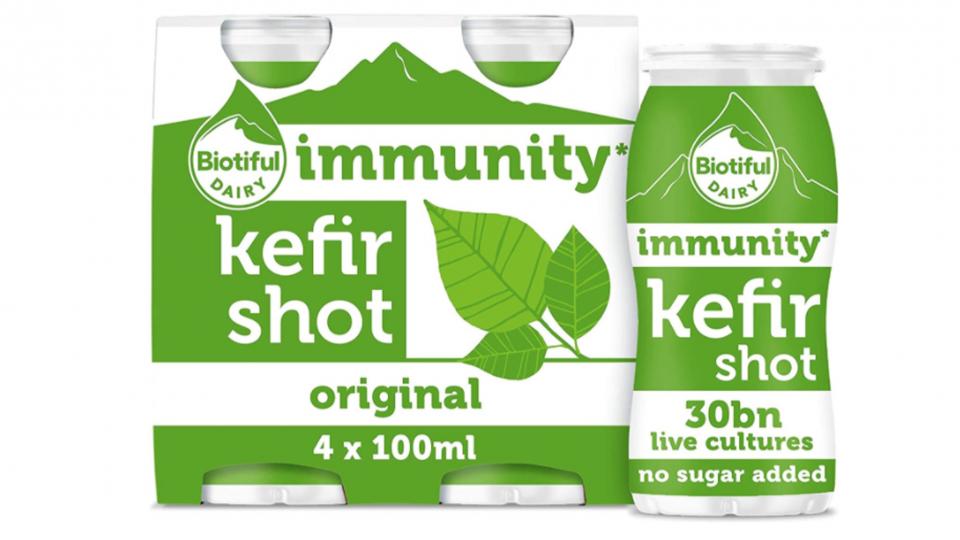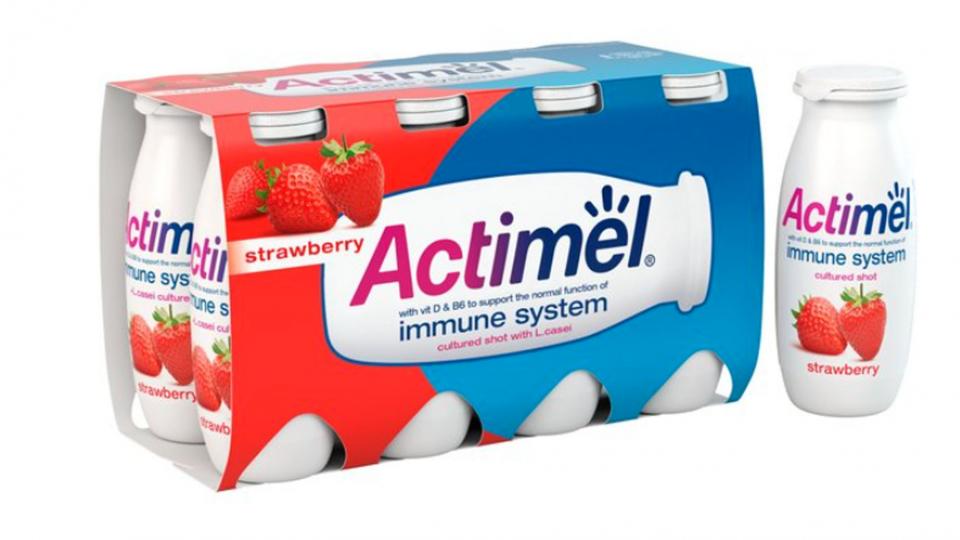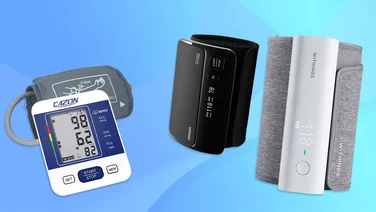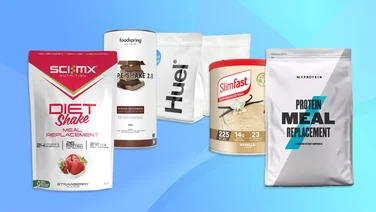To help us provide you with free impartial advice, we may earn a commission if you buy through links on our site. Learn more
- Best probiotics: At a glance
- How to choose the best probiotic for you
- How we test probiotic drinks
- The best probiotics you can buy in 2023
- 1. Symprove Daily Food Supplement: Best long-term probiotic drink
- 2. Biotiful Kefir Shot Original: Best kefir probiotic
- 3. Actimel Yoghurt Drink: Best probiotic drink on a budget
- 4. Yakult Fermented Milk Drink: Best daily probiotic drink
- 5. Biomel Probiotic Belgian Dark Chocolate Shot: Best dairy-free probiotic drink
- 6. Dare Motivational Shake: Best on-the-go probiotic
- 7. Remedy Kombucha 250ml: Best kombucha probiotic drink
- 8. Hip Pop CBD Kombucha: Best probiotic kombucha drink with added CBD
- 9. Moju Tropical Prebiotic Dosing Bottle: Best probiotic drink to wake you up

Feeling run down? Gurgly stomach? A mad bathroom rush after drinking your morning coffee?
The makers of probiotics drinks claim to be able to help by restoring the balance of natural bacteria in your gut.
Whether taken in the form of fermented drinks such as kefir and kombucha, or daily yoghurt shots with live cultures added, the idea is roughly the same: delivering specific ‘good’ bacteria cultures that are thought to have various health benefits.
There is some research to suggest that probiotics can be beneficial for those suffering from Irritable Bowel Syndrome (IBS) or diarrhoea caused by antibiotics. However, it’s important to note that the wider benefits of probiotics are disputable.
The NHS, for example, points out that there is no evidence to suggest that probiotics can help treat eczema, as some manufacturer’s claim. Probiotics are also classed as food, not medicine, meaning they don’t go through the same rigorous testing or regulation. Although probiotics may help with various problems, they shouldn’t be treated as medicine.
The bacteria in your gut is known to play an important role in overall health, and probiotics are generally thought to be perfectly healthy to take for those with a normal immune system. So while the claims made by probiotic companies should always be treated critically, there’s little risk in trying them for yourself to see whether or not they help with your digestion.
With such a wide range now on the market, we’ve tested the best probiotics that could help improve your digestive health. Scroll on for our quick probiotic guide, or skip to our roundup of the best probiotic drinks available.
Best probiotics: At a glance
- Best long-term probiotic drink: Symprove Daily Food Supplement | £79 (4 weeks)
- Best kefir probiotic drink: Biotiful Kefir Shot Original | £1.60 (250ml)
- Best probiotic drink on a budget: Actimel | £3.50 (8 bottles)
- Best daily probiotic drink: Yakult Fermented Milk Drink | £3.50 (8 bottles)
- Best dairy-free probiotic drink: Biomel | £1.49 (125ml)
How to choose the best probiotic for you
How do probiotics work?
There are billions of good bacteria living naturally in your gut. Collectively known as your gut microbiome or gut flora, these bacteria are responsible for aiding digestion and metabolism, supporting your immune system, and absorbing nutrients. Basically, they help to regulate your overall health. A myriad of factors can weaken the gut biome, from alcohol and processed food to stress, medication, and a lack of sleep, all of which can hamper nutrient absorption and lead to an inflamed gut lining.
Probiotics use ‘good’ bacteria, similar to what is in your gut flora. Their makers claim that when this bacteria is delivered to your gut, it helps replenish and rebalance the microbiome, which reduces the amount of work your gut goes through and therefore makes you less prone to illness.
What ingredients should I look for?
Probiotic drinks usually contain a combination of different strains. Lactobacillus, Bifidobacterium and Saccharomyces are all genus names of probiotic strains. If you see them – sometimes accompanied by a second word that indicates the strain’s “species” – then you know your product contains probiotics. Most live and active bacteria also need to be kept refrigerated to maintain their effectiveness, so it’s worth reading the labels of all probiotic drinks properly.
– Lactobacillus acidophilus is one of the most common friendly bacteria in probiotics. It lives in your intestine and helps produce lactic acid by breaking down the lactose in your body. It might also appear on labels as L. acidophilus or acidophilus, and other strains include casei, plantarum and rhamnosus.
– Bifidobacterium lives in your stomach and intestine, and helps with digestion and staving off harmful bacteria. You may see it written as Bifidobacterium bifidus or simply bifidus.
– Although considered a probiotic, Saccharomyces isn’t a type of bacteria – it’s actually a kind of yeast, and is most commonly known for treating and preventing diarrhea. Other names might be Saccharomyces boulardii or S. boulardii.
How we test probiotic drinks
We spent two weeks testing each of these probiotic drinks for their flavour profile and consistency. All probiotics were stored in the fridge until the moment of testing, so all were chilled when sampled. We took into account their serving size, ease of opening, packaging and how much space they took up on the fridge shelves.
It’s tricky to ascertain the improvement to a person’s overall health from drinking a daily probiotic for a limited time; nevertheless, we kept track of how we felt before, during and after testing each drink in order to eventually deliver a review of the listed products.
How we test probiotic drinks
We spent two weeks testing each of the probiotic drinks in the list below for their flavour profile and consistency. All probiotics are stored in the fridge until the point of tasting, so are chilled when sampled. We take into account their serving size, ease of opening, packaging and how much space they take up on fridge shelves.
It’s tricky to ascertain the improvement to a person’s overall health from drinking a daily probiotic for a limited time; nevertheless, we keep track of how we feel before, during and after testing each drink to deliver a review of the listed products.
The best probiotics you can buy in 2023
1. Symprove Daily Food Supplement: Best long-term probiotic drink

Price when reviwed: £79 (4 weeks) | Check price at Amazon If you suffer from IBS or significant digestive issues, you may have heard of Symprove. Because it’s a water-based supplement, Symprove won’t trigger digestion: instead, the brand claims it allows four strains of live bacteria to survive their journey through the stomach’s acidic environment where they can get to work on the gut. Symprove is designed as a 12-week programme to allow your body to adjust, and its makers claim that when a 70ml dose is taken daily, more than ten billion live bacteria will continually work to nourish the bacteria already present in your gut microbiome.
Symprove has a thin, easy-to-drink consistency, and it comes in two varieties of Original or Mango & Passionfruit. Unfortunately, the latter flavour won’t completely mask the supplement’s sour, acidic taste, which can take some getting used to first thing in the morning – especially as you’re told to wait ten minutes before eating or drinking. Luckily, the aftertaste fades pretty quickly, and we found that after a few days of taking Symprove it became much more bearable.
It’s not a cheap option – the recommended 12-week course is £150 – so some customers suggest trialing Symprove for a month (£79 for four bottles) to see what difference you feel. Symprove is also vegan friendly as it’s both dairy- and gluten-free.
Key features – Active ingredients: Lactobacillus rhamnosus; Enterococcus faecium; Lactobacillus acidophilus; Lactobacillus plantarum; Type: Water-based; Size: 500ml bottle
2. Biotiful Kefir Shot Original: Best kefir probiotic

Price when reviewed: £1.65 (250ml) | Check price at AmazonKefir is really popular at the moment, and Bio-tiful Dairy has nailed a delicious recipe for this fermented milk product that’s packed with probiotics. Kefir is made using live kefir grains, a type of gelatinous-looking organism which, when added to milk, break down the lactose sugars and ferment the milk (also imbuing it with billions of live cultures in the process). The low lactose content of kefir makes it a great option for those with mild lactose intolerances.
Bio-tiful’s kefir shots have a light, creamy taste and thick consistency that’s smooth to drink, but it can be a little sour if you’ve never tried kefir before. Bio-tiful Dairy has a massive range of flavours, not to mention formats: yoghurt pots, daily shots, ice cream and slurpy packets that are perfect for kids’ lunchboxes. We particularly like the honey and ginger kefir yoghurt, which has a lovely hint of spice, but the raspberry and pomegranate yoghurt is delicious too.
An added bonus of Bio-tiful Dairy products is their versatility: you can use them in tons of recipes as a cream or yoghurt alternative, and they’re particularly good in soups, smoothies and desserts. Plus, in late 2021, Biotful unveiled a new oat kefir that’s entirely plant-based and gluten free but still contains the same health benefits as the rest of the range. All the more reason to jump on the kefir bandwagon!
Key features – Active ingredients: Live kefir cultures; Type: Pasteurised & fermented cow’s milk; Size: 250ml bottle
3. Actimel Yoghurt Drink: Best probiotic drink on a budget

Price when reviewed: £3.50 (8 bottles) | Check price at Asda Actimel is a fridge staple around the country, and is well known for providing you with a tasty daily shot of yoghurty goodness. These little plastic bottles of cultured yoghurt come in a variety of flavours – everything from vanilla and coconut to a mix of mango, goji berry and turmeric – and each shot contains more than ten billion Lactobacillus casei cultures along with vitamin B6 and vitamin D for healthy bones and teeth.
We love the classic strawberry flavour, which tastes creamy and sweet, and also makes an appearance in Actimel’s 0% fat range. There’s a dairy-free range too, with a whole host of alternative flavours in plant-based form: choose from Almond Blueberry and Almond Mango & Passionfruit (as you may have guessed, this range uses almond milk instead of dairy).
Key features – Active ingredients: Lactobacillus casei; Type: Yoghurt drink; Size: 100g bottle
4. Yakult Fermented Milk Drink: Best daily probiotic drink

Price when reviewed: £3.70 (8 bottles) | Check price at Tesco Many of us may not know the difference between Yakult and Actimel, but it’s down to the specific “friendly bacteria” they contain. Yakult, which hails from Japan, is a fermented milk drink developed in the 1930s by Minoru Shirota, who then gave his name to the specific bacteria strain found in Yakult: L. casei Shirota. As well as the promised health benefits, this bacteria helps to give the drink its sweet, tangy, somewhat fruity flavour.
We’ve found Yakult to be something of an acquired taste, but it’s undoubtedly a hit for those with a sweet tooth. The sugar-free version, Yakult Light, has 67% less sugar than Yakult Original and is easily identifiable by its blue foil label instead of red. Rather wonderfully, Yakult refuses to change the size of its bottles from the tiny 65ml variety, so you always know what you’re getting.
Key features – Active ingredients: Lactobacillus casei Shirota; Type: Fermented skimmed milk drink; Size: 65ml bottle
5. Biomel Probiotic Belgian Dark Chocolate Shot: Best dairy-free probiotic drink

Price when reviewed: £1.49 (125ml) | Check price at Healthy Supplies If dairy gives you digestive problems, or you avoid it as a vegan, Biomel’s plant-based probiotic drinks are an absolute dream. Made with coconut milk, Biomel has four flavours that taste as decadent as they sound: we love the Belgian Dark Chocolate, which is like drinking a slightly nutty chocolate milkshake, but the Pure Vanilla, Natural Coconut, and the Almond Salted Caramel, made with almond milk, are equally creamy too. The consistency is quite thin, as you might expect from a coconut-milk-based product (not to be confused with coconut cream from a can).
Each of the chunky little shot bottles counts as one 125ml serving and contains billions of Lactobacillus cultures, as well as B6 and D vitamins and added calcium too. The lack of stomach irritants such as lactose and gluten makes them a great choice for allergy sufferers.
Key features – Active ingredients: Lactobacillus plantarum; Bifidobacterium bifidum; Type: Coconut milk drink; Size: 125ml bottle
6. Dare Motivational Shake: Best on-the-go probiotic

Price when reviewed: £30 (15 servings) | Check price at Dare If drinking a probiotic first thing in the morning isn’t your style, an on-the-go shake might be the perfect alternative to getting your daily probiotics. Dare is a plant-based protein powder invented by Ben Hamida, an A&E doctor who needed a meal alternative while on busy hospital shifts.
As it’s a powder, Dare doesn’t have to be kept refrigerated: simply add two scoops to 300ml water or milk and shake or blend to get the desired creamy consistency. Dare has three dessert-like flavours: Cocoa Vanilla Frosting, Cocoa & Peanut Butter, and Cocoa & Jaffa Orange. As you’d imagine, the taste is pretty chocolatey across the board – in fact, we found Dare to be quite sweet with the recommended two scoops, so give it a taste test until you find a balance that works for you.
Each 50g serving of Dare contains all the micronutrients you need for the day, including 20g of plant-based proteins along with tons of slow-burning complex carbs from pumpkin, sunflower, flaxseeds and nuts. Perhaps crucially for a shake, the texture isn’t at all gritty or chalky but smooth and easy to drink, due to its plant proteins instead of proteins from rice or pea. There are 15 servings in one pack, making it just £2 a serving.
Key features – Active ingredients: Lactobacillus acidophilus; Type: Powder added to water or milk; Size: 750g pack
7. Remedy Kombucha 250ml: Best kombucha probiotic drink

Price when reviewed: £7 (4 pack) | Check price at Holland and Barrett Slightly sour and unexpectedly fizzy, kombucha may be something of an acquired taste – but fans of the fermented tea-based drink are having a moment right now, as there’s more kombucha on supermarket shelves than ever before. We’re keen on the slim cans from Remedy, which come in five flavours, like raspberry lemonade, cherry plum, and ginger lemon. The latter has a lovely sharp, yet light taste and is a great alternative to alcohol or as an adult soft drink.
Brewed in small batches for thirty days, Remedy kombucha starts off as a sweet tea with added SCOBY (Symbiotic Culture Of Bacteria and Yeast) and raw sugar as a key starter ingredient. The long fermentation process converts all the sugar into natural organic acids, healthy living cultured bacteria, and plenty of antioxidants.
Available in both bottle (700ml) and can (330ml or 250ml) form, the smallest cans start at £2.19 and, at the time of writing, are currently on offer as buy 1 get 1 half price – or you can grab a four pack at £7.
Key features – Active ingredients: Live bacteria cultures and fermentation byproducts; Type: Fermented sweet tea; Size: 250ml can
8. Hip Pop CBD Kombucha: Best probiotic kombucha drink with added CBD

Price when reviewed: £16 (six 330ml cans) | Check price at Hip Pop
Hip Pop was initially created in response to one of the founder’s IBS issues, with the company’s line of fermented kombucha packed with live cultures, antioxidants and vitamins B and C. The resulting drink is absolutely delicious: light and crisp, with just a hint of flavour and a soft fizz.
Those concerned about the inclusion of CBD shouldn’t be. CBD is non-psychoactive, so a can of Hip Pop won’t alter your consciousness, with the 15mg here delivering a natural state of calm and focus. Free from artificial sweeteners – if you’re a fan of fizzy drinks, or trying to steer clear of alcohol, then it’s the perfect alternative.
Hip Pop’s CBD Kombucha range comes in three flavours: blood orange and grapefruit, cherry and blackberry, and passionfruit and guava, with the latter our favourite.
Key features – Active ingredients: Bacillus Coagulans; Type: Fermented tea with 15mg CBD; Size: 330ml can
9. Moju Tropical Prebiotic Dosing Bottle: Best probiotic drink to wake you up

Price when reviewed: £6.10 | Check price at Ocado
Moju is well known for its plant-based, cold-pressed shots that help you start the day, and the Tropical Prebiotic is no exception. Designed specifically for gut health and immunity support, the ingredients list is simple and fruit focused. The tropical version includes a spicy combination of baobab, lime and ginger, plus some mango, apple and orange for good measure, alongside a Moju blend of prebiotics. There’s no dairy, no additives and it’s totally vegan, which means it can easily be incorporated into any health plan, too.
The dosing bottle is designed to stay in the fridge and deliver a week’s worth of “gut health shots”, working out at about 87p per shot. Shots can be added to a smoothie, although we opted for a swig straight from the bottle each morning and really felt fired up afterwards. A dosing bottle may not work for all, though, so individually bottled shots are also available.
Key features – Active ingredients: Moju Prebiotic Blend; Type: Cold-pressed drink; Size: 420ml bottle







